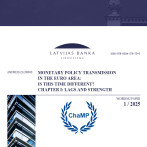Lending to businesses resuming; a stable rise in money supply not yet expected
As economic stabilization fostered the cooperation between businessmen and banks, a rise in the balance of loans granted to businesses was observed in July for the first time after dropping for a protracted period. Lending to households continued to shrink however, therefore the total bank loan portfolio still contracted slightly, but the annual rate at which domestic lending dropped improved (from 9.2% in June to 8.5% in July).
The balance of domestic loans in July dropped only by 0.1%, with the loans in euro contracting by 0.2%, loans in lats increasing 0.1% and loans in other currencies growing by 0.4%. The usual rate of contraction (0.7%) was kept by household lending, whereas loans granted to non-finance enterprises grew by 0.6%.
The cautious attitude to accruals in July was reflected in a moderately reduced money supply. The demand for cash currency posted a substantial seasonal growth while deposits with banks shrank, thus bringing down the money supply.
Money indicator M3, which characterizes the amount of cash and non-cash currency in the economy dropped by 0.6% in July, with the M3 annual rate of increase slowing to 4.3%. The annual rate of growth in deposits attracted to banks also slowed (to1.6%), whereas the annual growth of cash in circulation speeded up to 16.7%. A drop was observed in deposits made both by businesses and households both in lats and euro. Although short-term deposits and overnight deposits dropped, a rise in deposits with maturity over one year was observed for a fourth consecutive month (they have increased by 21.5% since March), pointing to a stable assessment of economic growth in the medium term.
The growth in the trade industry pointing to a resumption of domestic consumption and the still rapid rise in the imports of capital goods and intermediated consumption goods was reflected in the contraction in deposits by both households and businesses with banks. The uncertainty related to the expected parliament elections and drafting the 2012 budget as well as the risks on the rise in foreign markets do not allow for a stable resumption of rising money supply in the coming months.
The growth in loans directed at the business sector is a positive development, which, if it continued, could promote the competitiveness of the Latvian economy. Along with macroeconomic stabilization (reduction in the budget deficit), a further improvement in business competitiveness will be a very important factor in reducing the impact of the expected drop in foreign demand and the possibility of renewed crisis. In order for the cooperation trends between banks and businesses to continue the actions of the government in timely drafting of the 2012 budget, by avoiding any rise in taxes, are of utmost importance.
Textual error
«… …»






